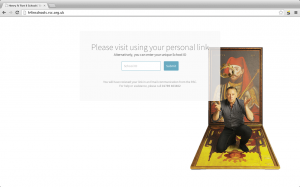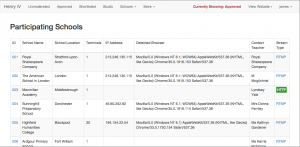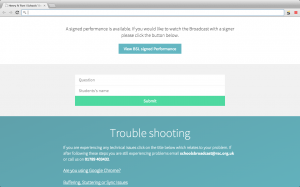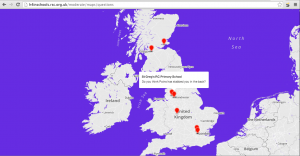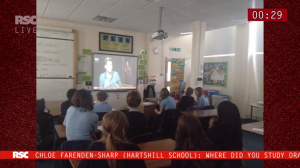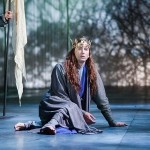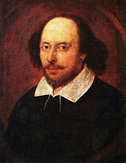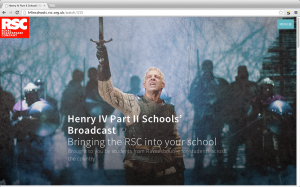 On June 6th and June 30th, Ravensbourne students managed two more live streaming events for the Royal Shakespeare Company, which I project managed on the Ravensbourne side, as with our Richard II event, and the I, Cinna event with which we began our relationship with the RSC. The two June events were so close together because they were the two halves of Henry IV – Part 1 and Part 2. We treated them as a single entity, so used the same basic website for both events. There were some tweaks in between, but the major leap had been in functionality since Richard II.
On June 6th and June 30th, Ravensbourne students managed two more live streaming events for the Royal Shakespeare Company, which I project managed on the Ravensbourne side, as with our Richard II event, and the I, Cinna event with which we began our relationship with the RSC. The two June events were so close together because they were the two halves of Henry IV – Part 1 and Part 2. We treated them as a single entity, so used the same basic website for both events. There were some tweaks in between, but the major leap had been in functionality since Richard II. 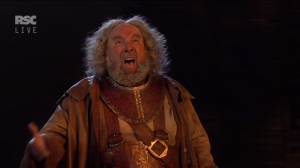 A sophisticated tracking and monitoring system had been implemented, and a much more elaborate moderation system for the questions. As with Richard II, we were embedding a recording of a RSC play that had recently been broadcast live to cinemas across the UK, and even the world, within a live studio show. This time, the presenter was the BBC’s Sonali Shah. We started off with her introducing the play, alongside some short promo videos, and then after the play we hosted a question and answer session in Ravensbourne’s TV studio, using questions that had been sent during the interval and after the play via our Web-based submission system.
A sophisticated tracking and monitoring system had been implemented, and a much more elaborate moderation system for the questions. As with Richard II, we were embedding a recording of a RSC play that had recently been broadcast live to cinemas across the UK, and even the world, within a live studio show. This time, the presenter was the BBC’s Sonali Shah. We started off with her introducing the play, alongside some short promo videos, and then after the play we hosted a question and answer session in Ravensbourne’s TV studio, using questions that had been sent during the interval and after the play via our Web-based submission system.
One of the students working on the project, the extremely talented Jon Lambert, created a tracking system where schools would log in using an id. The system was set up so you had to use an id to get onto the website. However, this wasn’t really there for security reasons, but so we could monitor which schools that had signed up for the event were actually participating, and what system they were using to access the website.  This meant we could help them troubleshoot if they were having problems with any part of the service we were providing. Despite these changes “under the hood”, the main website took a similar single-page scrolling design approach as for Richard II, although this time using a different code base, so we could employ a more discreet menu icon in the top right-hand corner, in similar fashion to many smartphone apps.
This meant we could help them troubleshoot if they were having problems with any part of the service we were providing. Despite these changes “under the hood”, the main website took a similar single-page scrolling design approach as for Richard II, although this time using a different code base, so we could employ a more discreet menu icon in the top right-hand corner, in similar fashion to many smartphone apps. 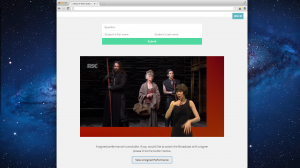 Another innovation with these productions was the implementation of signing for viewers with hearing difficulties. The whole performance was signed by the incredibly talented Becky Allen. Some of this was pre-recorded, and some was performed live. Viewers could easily switch between streams using a button on the website beneath the video window. This meant the events were much more accessible than our previous ones, and viewers with hearing difficulties could enjoy them as much as the fully abled.
Another innovation with these productions was the implementation of signing for viewers with hearing difficulties. The whole performance was signed by the incredibly talented Becky Allen. Some of this was pre-recorded, and some was performed live. Viewers could easily switch between streams using a button on the website beneath the video window. This meant the events were much more accessible than our previous ones, and viewers with hearing difficulties could enjoy them as much as the fully abled.
Another area of innovation was the question and answer system. For I, Cinna we had used a simple off-the-shelf PHP chat script for participants to send questions, but this didn’t leave much opportunity for moderation. So for Richard II we had moved to a custom design. 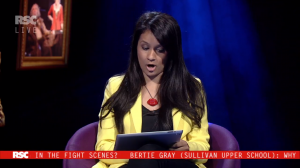 However, this PHP-based system had experienced some performance issues with the heavy traffic from an event involving the household name David Tennant. So for the Henrys we moved over to a new system, which provided sophisticated multi-level moderation queues, and used the signing-in ids to track who was asking which question.
However, this PHP-based system had experienced some performance issues with the heavy traffic from an event involving the household name David Tennant. So for the Henrys we moved over to a new system, which provided sophisticated multi-level moderation queues, and used the signing-in ids to track who was asking which question. 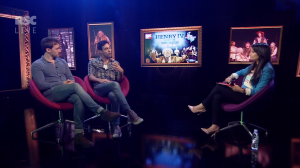 So schools only had to enter minimal information at the time of submitting the question on the website. In the first phase, the moderation team would then check to see if the question was valid, then to see if it was good enough to go on the onscreen ticker and map, and finally if it should be forwarded to the studio so it could be put to the guests during the live post-performance session. The system proved very effective, and meant we had full control over the various ways the school participants could see how their questions were getting through, and possibly even asked live.
So schools only had to enter minimal information at the time of submitting the question on the website. In the first phase, the moderation team would then check to see if the question was valid, then to see if it was good enough to go on the onscreen ticker and map, and finally if it should be forwarded to the studio so it could be put to the guests during the live post-performance session. The system proved very effective, and meant we had full control over the various ways the school participants could see how their questions were getting through, and possibly even asked live.
Schools were also invited to send pictures of themselves watching the event in their classrooms, and these were shown during the interval, so the school students had a greater sense that they were part of a special event. Not surprisingly, the number of schools participating wasn’t as great as for Richard II, as there was nobody quite as famous as David Tennant involved in these two productions. But they were still very successful, and Ravensbourne is now working on a three-year deal to produce three streaming theatre events with the RSC a year. This will allow us to develop further the strategies we are using to engage contemporary school students with the work of Shakespeare.
Related Posts


